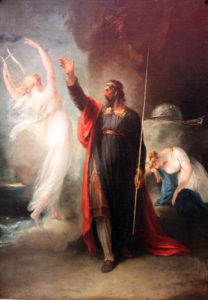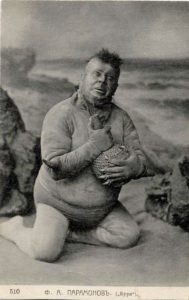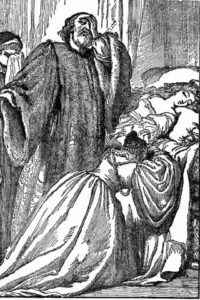I was beyond excited when I learned that Good Omens by Terry Pratchett and Neil Gaiman was being turned into a tv series. If you’re not familiar with the backstory, the two friends had basically agreed that there’d be no further work done on the property – no spinoffs, no merchandise, etc.. – unless they were in agreement. Well, Terry Pratchett went and died (*). And that was the end of that hope. Except for the part where he personally left a letter asking Neil Gaiman to make the movie version. Well, now that’s just ineffable, that is.
Anyway, this post would be a mile long if I keep blathering. The story tells of the friendship that is formed over thousands of years by the angel Aziraphale (Michael Sheen) and the demon Crowley (formerly “crawley”, as in snake…, played by David Tennant) because they’ve been stationed on Earth ever since Man was there, basically cancelling each other out so often that they get bored and stop wasting their time. I convince my kids to watch it with me, and they seem to like the first episode, so now it’s become family viewing time. One weekend night when everybody’s available we’ll all wind down and watch an episode, the whole family in the room, no electronics. Is very nice. My wife and oldest are on the big couch, my middle on the love seat, and my son on the chair in what I’m only just realizing is very Goldilocks and the three bears of us. I’m on the floor with pillows. Just to set the scene.
Each episode of the series shows how the friendship between angel and demon evolved (while, in the bigger arc, they plot in modern day to stop the end of the world). They show up in the Garden of Eden, they show up for Noah… Each time the angel is there as a sort of witness, and David Tennant is there to look confused and ask some very interesting questions. They actually show the crucifixion of Jesus in one episode, for example. Tennant’s demon asks, “What did he do?” and the angel responds, “Told people to be kind to one another.”
And then a title card pops up saying “1601 London” and I threw both hands up in the air and yelled excitedly, “They’re visiting Shakespeare! They’re visiting Shakespeare!!”
Cut to Aziraphale watching a rehearsal of Hamlet. It’s not very good. But the Shakespeare character keeps calling him Burbage, which is appreciated (though he’s too young and skinny for Burbage). Crowley shows up to watch for a little while and out of the clear blue drops some out of context Shakespeare (from another play that I won’t spoil) and I did an excited little dance there from my spot on the floor, arms up in celebration, because when I sat down to watch tv tonight I didn’t expect to get David Tennant doing Shakespeare.
I heard my oldest’s voice behind me say, “Yay, Daddy’s happy.”
Very much yes.
(*) He’s not gone, he’s just in the clacks.
 I don’t know how I missed this back in May, but Keanu Reeves – Man of the Internet Hour – John Wick, “Neo”, “Ted Theodore Logan”, player with puppies, rider of subways, anonymous donator to children’s hospitals – is an admitted Oxfordian.
I don’t know how I missed this back in May, but Keanu Reeves – Man of the Internet Hour – John Wick, “Neo”, “Ted Theodore Logan”, player with puppies, rider of subways, anonymous donator to children’s hospitals – is an admitted Oxfordian.

 I’ve admitted on plenty of occasions that I still have a lot to learn about Shakespeare. In fact, it is when I learn something new that I am again thrown back into my love for the subject as I run to the text and visit with my old friends again.
I’ve admitted on plenty of occasions that I still have a lot to learn about Shakespeare. In fact, it is when I learn something new that I am again thrown back into my love for the subject as I run to the text and visit with my old friends again. I hate that so much. That means that, for starters, Caliban is not left alone on the island as he wanted. Worse, he doesn’t even have a kingdom, because Ariel’s not about to listen to him. Ariel and Caliban hate each other. So now I envision the ending of my favorite play with Caliban trying to be left alone and Ariel, now bored silly, forever tormenting him because there’s nothing else to do.
I hate that so much. That means that, for starters, Caliban is not left alone on the island as he wanted. Worse, he doesn’t even have a kingdom, because Ariel’s not about to listen to him. Ariel and Caliban hate each other. So now I envision the ending of my favorite play with Caliban trying to be left alone and Ariel, now bored silly, forever tormenting him because there’s nothing else to do. Here’s a simple game. Pick a play. Now pretend you’re doing a production where the gimmick is that it’s told from a different character’s point of view than normal. Which play do you pick, which character and how does the play change?
Here’s a simple game. Pick a play. Now pretend you’re doing a production where the gimmick is that it’s told from a different character’s point of view than normal. Which play do you pick, which character and how does the play change?